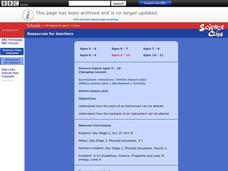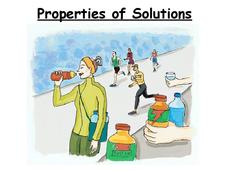Curated OER
Making A Compass
This interesting science instructional activity is about the compass. Students make a compass out of a magnet, sewing needle, cork, and a glass dish. The instructional activity includes both a pre and post-test for the students to take,...
Alabama Learning Exchange
Magnet Mania
Young scholars explain how magnets can be used to make some things move without being touched. They explore that electricity in circuits can produce light, heat, sound, and magnetic effects. They create an electronic poster about magnet...
Curated OER
Wire Types and Sizes
In this wires worksheet, students answer 16 questions about types of electrical wires, their gauge or sizes, the ampacity of wires and conduit.
Curated OER
Conductors and Insulators Experiment
In this conductors and insulators experiment activity, students follow the procedures to set up an experiment that tests which common materials are conductors or insulators.
Curated OER
Electrostatic Review Worksheet
In this electrostatic worksheet, students determine the potential of a charge that moves in an electric field. Students define a coulomb, This worksheet has 5 multiple choice questions and 2 problems to solve.
Curated OER
Changing Sounds
Students identify how the pitch and the loudness of an instrument can be altered. In this online science of sound lesson, students employ the use of an interactive whiteboard to examine the loudness and pitch of a guitar, drum, and...
Curated OER
Changing State
Learners investigate the cooling and heating of water. In this online science experiment lesson, students work in groups to make predictions regarding freezing and boiling points and then test those predictions as they complete the...
Curated OER
How We See Things
Students explain that when a beam of light is reflected from its surface, it changes direction. In this virtual science experiment lesson plan, students complete an activity that requires them to investigate how flat mirrors reflect...
Curated OER
Characteristics of Materials
Young scholars describe and compare common properties of various classroom materials. In this science/matter lesson, students observe common classroom items and the materials they are made of to complete a list of common properties.
Curated OER
Voltmeter Design
In this voltmeter activity, learners design and mathematically analyze a circuit they design. They also answer 17 questions about voltmeters, the voltage in given schematics, and the resistance in voltmeters.
Curated OER
Physics Rules and S.I. Units Game
For this physics rules worksheet, students complete questions and answers in order to review physics rules with each other. Students complete 26 questions.
Curated OER
Electricity/Magnetism
Second graders experiment with ballons to see which objects will cling and which objects will not. They use an assortment of objects, paper clips, pennies, button, scraps of paper, or puffed cereal. They make predictions and record results.
Curated OER
Homopolar Motor Experiments
Students construct a homopolar motor following certain procedures. In this physics instructional activity, students explain how generators and motors work. They compare and contrast the characteristics of both.
Teach Engineering
Maximum Power Point
Investigate the maximum power output of a photovoltaic panel with a instructional activity that introduces the class to the maximum power point. Individuals learn how to determine the maximum power point of a solar panel by using Ohm's...
BBC
Ourselves
Young biologists identify parts of the body, sort humans from other animals, and list the difference they see. Learners are split up into groups of three, and each group must find pictures in magazines of humans and other animals. They...
BBC
Sound and Hearing
First and second graders recognize that sound is generated in a variety of ways, and that it comes from many different sources. They explore tone and volume, realizing that there are different ways to describe sound. Some musical...
BBC
Light and Shadows
Light is such an amazing thing! Elementary schoolers explore the wonderful world of light and shadow. The lesson plan is meant to be carried out on a whiteboard. Objects are placed in front of a light source, and learners must predict...
US Department of Energy
The Ring Fling Machine
Class members build a machine to demonstrate Lenz's law and help this scientific principle come to life. After building a ring fling machine, instructions for properly operating the machine and a few thought-provoking questions lead to...
Texas State Energy Conservation Office
Investigation: Concept Mapping Fuels
After reading an article, "Fuels for Everything," collaborative groups create a concept map poster of the transportation and non-transportation fuels. This makes a strong introduction to the different types of fuels used for transportion...
Science Geek
Properties of Solutions
Study the properties of solutions as they relate to mixtures. The slide show presents the key concepts involved with solutions including solvents, solutes, solubility, and electrolytes. Scholars learn the basics of the properties of...
Science Geek
Electrochemistry
Introduce redox reactions including how to identify and solve them. After reviewing the rules for assigning oxidation numbers, a presentation presents trends and vocabulary. Finally, it explains voltaic cells, electrolytic cells,...
Curated OER
Conductors and Insulators
Fifth graders investigate conductors and insulators by testing their hypotheses. They use copper wire and batteries to light a bulb. They use a penny and a plastic spoon to determine which is an insulator and which is a conductor.
Curated OER
Understanding Power using Kirchhoff’s Rules
Twelfth graders cite real life applications of Kirchhoff's rules. In this physics lesson, 12th graders calculate current, power and voltage using Kirchhoff and Ohm's laws. They explain the different components and uses of transformers.
Curated OER
Electronic Technology
In this electronic worksheet, students complete 4 short answer, 6 fill in the blank, and 4 term identifications about electronics.























